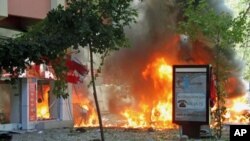Turkey is continuing to amass soldiers on the Iraqi border ahead of an expected incursion against bases of the Kurdish rebel group, the PKK. Violence has been escalating between the rebels, fighting for greater minority rights, and the Turkish armed forces. An explosion Tuesday in the capital, Ankara, that killed several people has been blamed by the government on the PKK.
Tuesday's explosion brought havoc to the Turkish capital, Ankara, as it damaged cars and shops near government buildings and a school. The government says the chief suspect is the PKK, which seeks autonomy in southeastern Turkey.
The response by the Turkish armed forces was swift, bombing rebel bases in the Kandil mountains in neighboring northern Iraq. For the last month, the region has been under sustained bombing by Turkish jets. The PKK has struck back in numerous fatal attacks inside Turkey in the last few weeks. The conflict is set to escalate even further if there is a major land incursion against the PKK bases in northern Iraq.
Bahcesehir University political scientist Cengiz Aktar said: "If we follow the governmental rhetoric, [a] cross-border operation is more likely. The problem is that the Turkish conflict did not start in the Kandil mountains. It did not start with the PKK. It's a hundreds-year-old problem, and it could be solved only at [the] negotiation table."
Thousands of Turkish soldiers already are gathered on the Iraqi border. Ankara has launched dozens of cross-border operations in the past, trying to strike at Kurdish PKK bases inside Iraq, to little effect. But this time, the government also is putting diplomacy to work.
Senior diplomats have been courting Iraqi Kurds for cooperation. Ankara has in the past few years markedly improved relations with the Iraqi Kurdish leadership. Turkish Prime Minister Recep Tayyip Erdogan is expected to visit Tehran in the next week to lobby for neighboring Iran's support.
Turkish parliamentary deputy Ertugral Kurkcu of the pro-Kurdish BDP party warns that the government would be making a fatal mistake if it carries out any cross-border operation.
"The basic demand of the population is not met. Weapons cannot counterpose demands for identity. Therefore, escalation in violence is going to increase violence in every corner of the country," said Kurkcu.
However, Soli Ozel, political columnist for the Turkish daily newspaper Haberturk, said the government, which has committed itself to introducing pro-Kurdish reforms, will be looking to undermine Kurdish support for the PKK by exploiting their weariness with the conflict, which has raged for nearly three decades.
"The government is banking on the fatigue of the Kurdish population of the violence of the PKK, and there is enough indication that we've seen in the country, Kurd and Turk, basically [crying] out 'we no longer want to see violence,' that they are sick and tired of it," said Ozel.
But political scientist Aktar warned that the rising PKK violence may be only a taste of what could follow an escalation in the conflict by the government.
"It will put more oil on the fire. Very harsh terrorist action in the cities and towns in the country. This has very strong power to destabilize the government and the country," he said.
Observers say any military incursion into Iraq likely would occur in the next few weeks, before the onset of the harsh winter. The size and magnitude of any potential incursion is now seen as critical to determining the direction of a conflict that has seen more than 40,000 people killed since the PKK took up arms in 1984.
Tension Escalates Between Turkey and Kurds
- By Dorian Jones














